















Why Purchase from All-Star Telescope?
Free Expert Support
Whether you are a first timer needing help with setting up or an enthusiast that can't quite make that one thing work, our expert staff are ready to support your needs. With decades of knowledge and first hand experience we've been there and we can help you through it!
Stress Free, Secure Transactions
You can trust purchasing and delivery with All-Star Telescope. All of our transactions are 100% secure and Level 1 PCI DSS compliant thanks to Shopify's ShopPay platform. For additional protection, we insure 100% of the value of every shipment we make. If it get's lost during shipment, we replace it. If it gets damaged during shipment, we replace it. We make sure your product arrives exactly as you would expect it to; we promise.
We also ensure privacy protection. We never keep any of your credit card information on file and any of your personal data is stored according to our policies.
30 Day Return Policy
Buy with confidence knowing that we accept returns up to 30 days after purchase. We want you to have something you will actually use and we are confident that we keep good quality products in our store with No Junk.
Price Match Promise
Shipping around for the best price is tough, we make it easier by offering the best pricing in the market. But if you find a better price on an in-store item somewhere else we will match it!
Recommended Accessories

ZWO 30mm f4 Mini Guide Scope (ZWO-30F4)
This is a great, lightweight guide scope. Compatible with any ZWO planetary or guide camera and capable of vastly improving your astrophotography m...

ZWO 30mm f4 Mini Guide Scope (ZWO-30F4)

ZWO ASIAIR PLUS (ZWO-ASIAIR-PLUS)
You may have heard of the ASIAir, but if you haven't, it's a groundbreaking device that drastically simplifies astrophotography. This will allow y...

ZWO ASIAIR PLUS (ZWO-ASIAIR-PLUS)

ZWO Dovetail Groove for ASIAIR PLUS (ZWO-D...
Product Description
ASI174MM Mini camera integrates Sony IMX174LLJ / IMX174LQJ 1/1.2″ sensor (11.3 mm x 7.1 mm). It is the first model in the “mini”-series of cameras from ZWO. This camera has 1936 x 1216 pixels with a pixel size of 5.86 μm x 5.86 μm. It camera provides 12-bit ADC and its QE peak is 77%.
ASI174MM mini camera offers you very good performance for planetary imaging as well as for guiding. Low read noise, high dynamic range, AR protective window and much more are just some of the key characteristics that set it apart from the competition.
174Mini vs. 174MM
Compared with the ASI174MM camera, the new 174-Mini has a sleeker design, less weight, and it can reach focus at the same position as an eyepiece.
USB2.0Port & ST4 Port
USB 2.0 Port: Mini camera has one USB2.0 type-C port. Type-C port is very popular in mobile phones, as it doesn’t matter which way you connect it (unlike for example type-A or type-B)
ST4 Port: The camera can be connected directly to the auto-guider port of the mount.
Connecting Diagram (refer to photo)
- M28.5-CS adapter
- CS-C adapter
- 1.25″ extender
- 1.25″ filter
Specifications
| Sensor | Sony 1/1.2″ CMOS IMX174LLJ/IMX174LQJ |
| Resolution | 2.3 MP (1936 x 1216) |
| Pixel Size | 5.86 µm |
| Minimum Exposure | 32 µs |
| Maximum Exposure | 300 s |
| ROI | Supported |
| Interface | USB 2.0 |
| Bit Rate | 12bit output (12bit ADC) |
| Adapter | 1.25" M28.5x0.6 |
| Dimensions | 36 mm x 61 mm |
| Weight | 140 g (4.9 oz.) |
| Working Temperatur | -5ºC - 45ºC |
| Storage Temperatur | -20ºC - 60ºC |
| Working Relative Humidity | 20% - 80% |
| Storage Relative Humidity | 20% - 95% |
Additional Articles, Videos, and Links
External Links
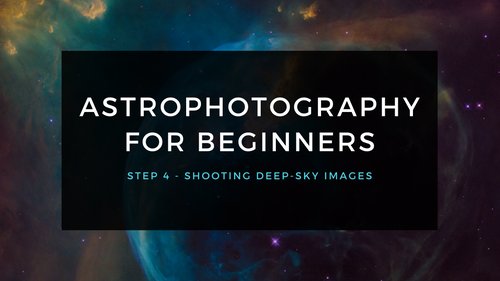
Astrophotography for Beginners Step 4: Shooting Deep-Sky Images
Taking deep sky pictures can be daunting, luckily there is an easy process to follow to allow you to get great shots! Here is the typical process for actually taking deep-sky images in the field.
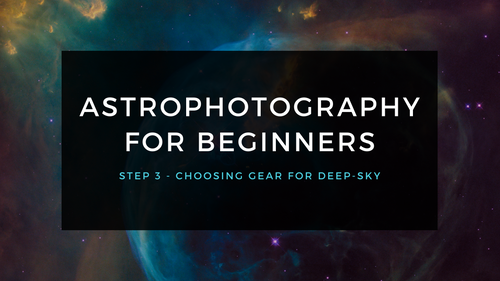
Astrophotography for Beginners Step 3: Choosing Gear for Deep-Sky Imaging
Using a star tracker gains you experience with the fundamentals of deep-sky imaging. Shooting the Moon gains you experience focusing and framing through your telescope. Through your sessions you’ll...
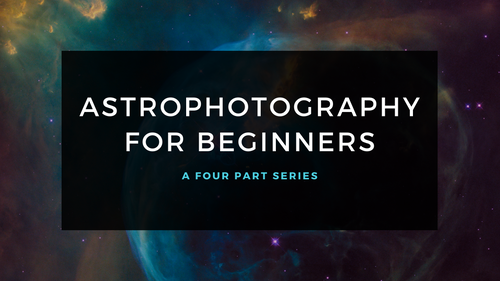
Astrophotography for Beginners - Start Here: Getting into Astrophotography Step by Step
Shooting the night sky has never been more popular, nor easier. The choice of equipment has also never been better, or more affordable. However, as per the advice given by Dickinson and Dyer in the...
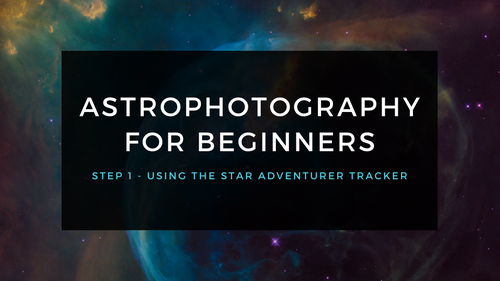
Astrophotography for Beginners Step 1: Using the Star Adventurer Tracker
By far the most economical and easiest way to capture beautiful images of the Milky Way and large deep-sky objects like the Andromeda Galaxy (shown here) is to use a star tracker. Here are steps an...
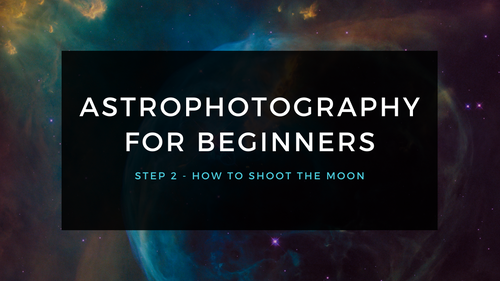
Astrophotography for Beginners Step 2: How to Shoot the Moon
Close-ups of the Moon are rewarding, and an easy way to learn to shoot through your telescope. While good results are possible with a phone camera clamped to an eyepiece (as shown below), this tuto...



